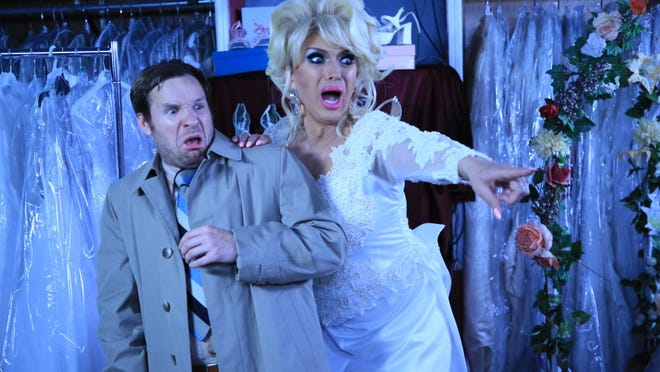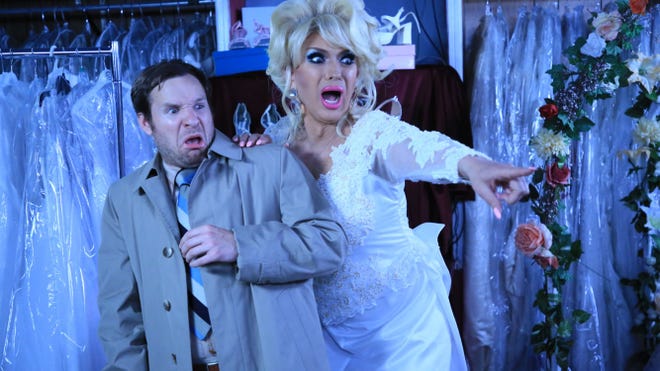
If you’re a film fan, each new screening these days might inspire something like pride. Over the past year and a half of the pandemic, theaters and festivals both have faced overwhelming existential questions, as have we all.
After planning a grand in-person celebration Aug. 26-Sept. 9, aGLIFF organizers scaled back some events for this year’s edition of their annual LGBTQ film festival. Parties were called off. More films were made available virtually. Most physical screenings were streamlined to a single venue.
The grand finale screening of bawdy comedy “S*it & Champagne” brought fest-goers to Pioneer Farms on Sunday night for yet another pandemic drive-in experience. And as thunder rolled in, and winds tangled with Rocket Cinema’s giant outdoor screen (what’s a drag queen look like folded in half?), all I could think was, “I’m glad that people aren’t giving up on stuff like this.”
Here’s a recap of a few aGLIFF films to keep an eye out for, or not.
More:What to know about the Texas State Fair concert lineup, deep fried foods, and more

‘Blitzed’
The feeling that there’s not going to be a future sometimes leads to earth-shaking art, this British documentary shows. Resonant, no? The fest’s opening film (originally slated for a big Paramount Theatre screening before the COVID-19 surge) was the North American premiere of this film from directors Bruce Ashley and Michael Donald.
If you remember from history class (or “The Crown”), the 1970s in London were a bleak time. And on the cusp of the ‘80s, as National Front skinheads marched in the street and labor strikes boiled over in the Iron Lady’s country, one nightclub called the Blitz gave a creative refuge to the kids who, as Bowie instructed, were ready to turn and face the strange.
You might have seen documentaries on the NYC club kids, but for an American audience, “Blitzed” is a great primer, and a fondly told oral history, of a short-but-gleaming era when marginalized people harnessed the chaos and had a party. From one underground hub came Culture Club, Spandau Ballet, Sadé and more outsiders who eventually invaded the inside.
More:Watch: The Belle Sounds on a roll with ‘All About Love’ skating footage in new music video
Club founder Steve Strange has died, and his friends speak of him in the film as a historical hero; it makes you wonder how today’s kids will talk about their own spaces 50 years on. The army of talking heads — ‘80s icon Boy George, fellow pop gender-bender Marilyn, scene queen Princess Julia, milliner Stephen Jones and so many more — are the world’s coolest encyclopedia come to life.
As “Blitzed” points out, the London of the time was not all that far removed from the devastation of World War II — bomb sites remained — and the club’s avant-garde parody of wartime aesthetics was “quite camp,” as Princess Julia puts it at one point. It took a lot to look fabulous all the time with no money, and for the kids who were used to putting their heads down in the street, the Blitz was a protective home.
Next time you see a guy with fabulous nail polish, think of the Blitz and its patrons — as Boy George puts it, “the forerunners of a man’s right to be pretty.”

‘Everybody’s Talking About Jamie’
Everybody was indeed talking about “Jamie,” director Jonathan Butterell’s adaptation of the West End musical sensation. Here, working class teen Jamie (Max Harwood) delivers papers in the rain in Sheffield, where his single mom (Sarah Lancashire) toils to keep them afloat. Though Jamie’s homophobic father has abandoned them for a new family in the same small town, the home is a happy one, and Jamie’s mom supports him unequivocally in his big dream: to become a famous drag queen. A fine dream, if pretty postmodern.
There are some things to like amid the low-rent melodrama. Jamie’s relationship with his best friend Pritti (Lauren Patel) sparkles, and their supportive energy as two outcasts who refuse to hide is genuinely inspiring. But mostly, “Everybody’s Talking About Jamie” is a sopping, incoherent outing, marketing a bland, Disney-fied version of drag as compelling as a motivational poster.
The muted Harwood is an awkward fit as a show-stopper — even in his fantasies, the show seems easily stopped. And poor Sharon Horgan (of “Catastrophe”) plays a pragmatic teacher awkwardly shoehorned into a vaguely bigoted antagonist role.
Not even Richard E. Grant, as aging drag queen Loco Chanel, shows up enough to save the experience, and a cameo from real-life drag superstar Bianca del Rio (who played Loco in the stage show) is the most bizarre inside joke in a movie that can never decide if its audience knows what a drag queen is or not. Maybe most frustrating: A weepy video montage tries to connect Jamie’s self-actualization to the brave, tragic queer people who faced the AIDS crisis in the 1980s. And unless I missed it, no one ever really brings that up again, leaving it as a musical plot device that’s not nearly as elegantly handled as it wants to be.
If “Everybody’s Talking About Jamie” helps any queer kid feel seen, then bravo. But let’s hope studios like Amazon — which starts streaming the movie on Sept. 17 — can bankroll better attempts in the future.

‘Invisible’
Hands down the best film I saw at aGLIFF this year was a documentary about the queer women forced into country music’s shadows.
In a modest documentary style, T.J. Parsell’s “Invisible” shines an overdue spotlight on artists like Mary Gauthier, Chely Wright, Mary Ann Kennedy and Pam Rose, who for one reason or another found themselves marginalized by the Nashville scene despite prodigious talent. Parsell doesn’t shy away from the personal, either. The audience spends time with Kennedy, estranged from her family for years, on her ranch, and the gravity of the pain ignorance inflicted on her life is given quiet weight. The movie also visits Cidny Bullens, who is transgender, in a sequence that speaks to the power of finding yourself no matter the age.
The Austin angle drew me in; the film endeavors to expand its view to Southern music more broadly, and local singer-songwriter Ruthie Foster is featured.
But “Invisible’s” real treasure is Dianne Davidson, once a promising newcomer who sang with Linda Ronstadt’s band before a refusal to live in the closet cost her success. A warm, garrulous presence on camera, a scene of Davidson playing for Ronstadt in the living room of her legendary old friend, now silenced by a degenerative condition, is as heartwarming and heartbreaking as anything I’ve seen lately. Two women of titanic artistic ability, still finding a little harmony.

‘Saint Narcisse’
In 1970s Canada, Dominic (Félix-Antoine Duval) loves looking at himself, so it’s with surprise but great excitement that he discovers a long-lost identical twin living in a perverted monastery. (I mean, that’s the best way to describe it.) In director Bruce LaBruce’s depraved corner of cinema, that leads to some, let’s say, taboo behavior, including but not limited to intimacy and revenge.
Perhaps a little too deadpan for a black comedy, but definitely not acceptable in polite society as a straight thriller (and there’s nothing straight happening here, anyway), “Saint Narcisse” might satisfy shock-lovers seeking midnight movie fare. It’s no John Waters, and nothing really can be, but a little more tongue in the ol’ cheek would have made this one go down easier. If your thing is watching very sincere Canadians in X-rated situations, go nuts.
More:Why you need to check COVID-19 policies before seeing live and screen shows in Austin
‘Nimby — Not in My Backyard’
White privilege comes to life in this woefully misguided Finnish thriller from writer-director Teemu Nikki. Girlfriends Mervi and Kata (Susanna Pukkila and Almila Bagriacik), trying to dodge a visit from Kata’s parents, head from urban Helsinki to rural lands to come out to Mervi’s parents instead. Mervi’s ex-boyfriend just so happens to be a neo-Nazi thug back home, and Kata’s mother just so happens to be an internationally renowned refugee advocate. Plot hijinks ensue, and all the families end up trapped in Mervi’s childhood home, where her parents have been living in polyamorous bliss with the neo-Nazi ex-boyfriend’s intolerant parents.
So. A lot. Spoilers below.
“Nimby” spends most of its runtime as a spiky blend of “Happiest Season” (lesbians go home to come out to an unlikable family) meets “Green Room” (city hipsters fight off a rural neo-Nazi siege). But wouldn’t you know it, the neo-Nazi ex gets a redemptive arc, the human rights advocates are chastised for jumping to conclusions, a group of refugees comes to fight the skinheads, and the whole thing ends with a full-throated “We’re actually more alike than different and we just need to talk” monologue.
Very fine people on both sides, but make it Finnish. Repugnant!

‘Boulevard! A Hollywood Story’
Each year, aGLIFF usually programs a deep-dive documentary that peels back a hidden queer history behind some beloved piece of culture. This year’s centerpiece film takes up the torch, and it’s a film buff’s dream.
You know about Andrew Lloyd Webber’s Broadway musical adaptation of classic noir flick “Sunset Boulevard.” What probably eluded you is that the movie’s star, Gloria Swanson, tried to make a musical adaptation first, not long after the 1950 Billy Wilder film came out.
The casting of silent film starlet Swanson as the aging diva Norma Desmond has long been mined for metatextual gold, though any direct comparisons between Swanson and her homicidal, delusional role would be uncharitable. But “Boulevard!” makes a case that there was probably a little more truth in the fiction than we ever knew, tracing a line from Swanson’s late-career grasps at enduring fame to her doomed collaboration with songwriters Dickson Hughes and Richard Stapley. Hughes and Stapley were a gay couple, and Swanson’s feelings for failed matinee star Stapley, director Jeffrey Schwarz argues, were not entirely professional.
“Boulevard!” is ultimately a little hamstrung by how much remains unknowable — its subjects have died, and so much queer history is lost to the silence of time — but for lovers of old Hollywood, musicals or hot goss, it’s a must-see.
We Love This So Much:The hella scary 1990s of ‘Brand New Cherry Flavor’
‘The Sexplanation’
San Francisco filmmaker Alex Liu’s family never talked about sex, and he certainly never got healthy messages about being gay from school. So, in “The Sexplanation,” he sets out for a remedial education, and to find out why America is so ashamed of something that’s just a fact of life.
If you’re a product of the Texas school system or church purity culture, “The Sexplanation” might tweak a similar curiosity inside you. Liu’s front and center in this documentary, which could have used a few other personal narratives, but his shame-free journey certainly has secondhand healing properties all the same.
Probably no point in urging restraint on this one, but be forewarned: The film never met a provocative image (say, a penis-shaped baked good) or dirty pun it didn’t go for, so, feel free to groan.
‘S*it & Champagne’
What better way to close out an LGBTQ film festival during a crappy time than a scatalogical 1970s exploitation parody starring drag queens?
(Rhetorical; this was a top-tier way.)
D’Arcy Drollinger stars as Champagne, a bad-ass stripper with a knack for disguise. When her boyfriend and best friend are killed, she uncovers a conspiracy of drugs, brainwashing, escorts and a big-box retailer, with the evil Dixie Stampede (Matthew Martin) at the top.
More camp than a hammock in a soap opera, “S*it & Champagne” revels in filth and fun, winks and wigs. For as low-brow and low-budget as the proceedings are — I mean, you read the synopsis — the pitch-perfect pastiche really looks impeccable, from the costumes to the editing. Whether your point of reference for the era is “Foxy Brown” or “The Brady Bunch,” Drollinger’s pumped it full of gas here, and there’s no putting the cork back in once it starts.








